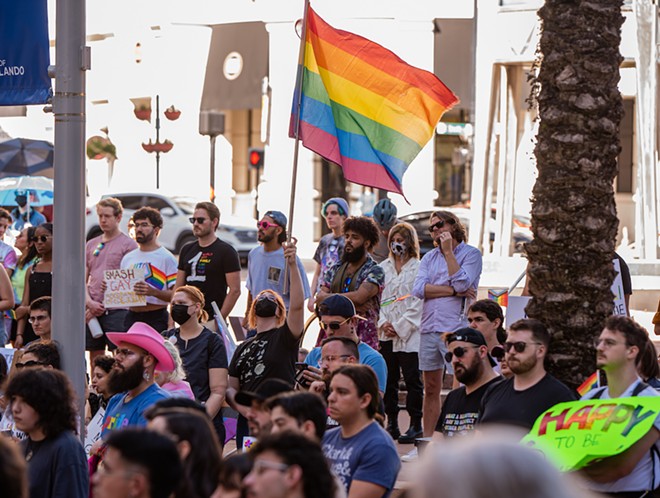Photo by Matt Keller Lehman
Fight for Trans Rights rally on Saturday, March 11, at City Hall in downtown Orlando
For the second time in less than a year, a Central Florida federal judge has dismissed a lawsuit challenging a 2022 state law that restricts instruction about gender identity and sexual orientation in schools.
U.S. District Judge Wendy Berger on Wednesday issued a 37-page ruling rejecting a lawsuit filed by parents, students and a non-profit group against members of the State Board of Education and the school boards in Orange, Indian River, Duval and Palm Beach counties.
Berger dismissed an earlier version of the lawsuit in October, though she allowed the plaintiffs to file a revised version. Berger’s ruling Wednesday included a series of issues, including her conclusion that most of the plaintiffs had not shown legal standing.
In February, Tallahassee-based U.S. District Judge Allen Winsor dismissed a separate lawsuit challenging the controversial law. Plaintiffs appealed that ruling to the 11th U.S. Circuit Court of Appeals.
The 2022 law, which has drawn national attention, prevented instruction on gender identity and sexual orientation in kindergarten through third grade and required that such instruction be “age-appropriate … in accordance with state academic standards” in older grades. Supporters called the measure the “Parental Rights in Education” law — while opponents labeled it the “don’t say gay” bill.
The Republican-controlled Legislature and Gov. Ron DeSantis went further this year by approving a bill to broaden the prohibition on instruction about gender identity and sexual orientation to pre-kindergarten through eighth grade.
Plaintiffs in the Central Florida case are Orange County residents Jennifer and Matthew Cousins and their four children, including a student who is gender non-binary; Will Larkins, who was a senior last year at Orange County’s Winter Park High School and president of the school’s Queer Student Union; a married same-sex Indian River County couple, David Dinan and Vik Gongidi, who have two children in public schools; and the non-profit CenterLink, Inc., which has members including LGTBQ community centers in Orange, Duval and Palm Beach counties.
The lawsuit, in part, alleged the law violates First Amendment rights and chills speech related to sexual orientation and gender identity. It also raised equal-protection and due-process arguments.
“The impact of the law has been immediate and severe,” the revised version, filed in November, said. “Defendant school boards and their agents have already begun implementing significant changes under the law. They have instructed teachers to review hundreds of books that acknowledge LGBTQ+ people and families and have eliminated vital support systems for LGBTQ+ students, including guidance and training that combat bullying and violence.”
But in Wednesday’s ruling, Berger wrote that almost all of the plaintiffs lacked legal standing. She said only two of the Cousins family children had “allegations sufficient to establish standing” on First Amendment issues.
As an example, Berger wrote that Dinan, one of the Indian River County parents, alleged he censored himself while chaperoning a school field trip “because he was concerned that mention or discussion of his husband or family could have been considered classroom instruction by a third-party.” But Berger rejected his First Amendment arguments.
“While Dinan felt his speech was chilled when he was acting as a chaperone, plaintiffs still fail to offer any argument as to how a reasonable person would have objectively believed that mentioning his same-sex spouse while acting as a chaperone would constitute instruction on sexual orientation or gender identity,” she wrote.
While Berger focused heavily on standing issues, she also rejected the lawsuit on other grounds. That included saying the lawsuit was what is known as an improper “shotgun pleading.”
“Plaintiffs also continue to include numerous allegations that appear to be wholly immaterial,” Berger, who was appointed to the federal bench by former President Donald Trump, wrote. “Even if such allegations are not immaterial, the complaint is not the proper place for legal argument or posturing.”
Subscribe to Orlando Weekly newsletters.
Follow us: Apple News | Google News | NewsBreak | Reddit | Instagram | Facebook | Twitter | Or sign up for our RSS Feed

